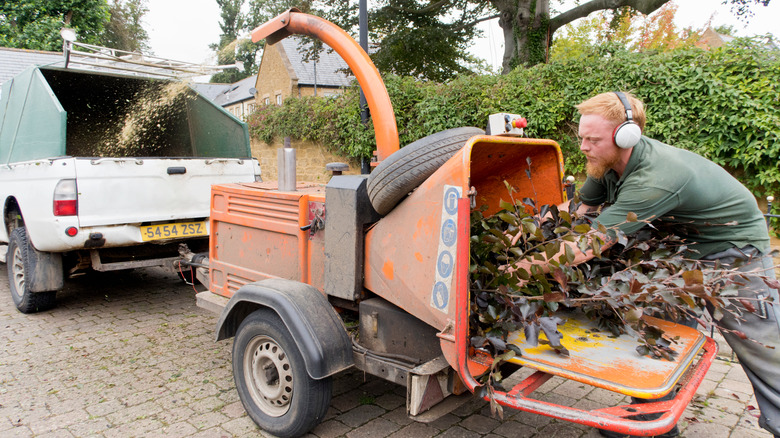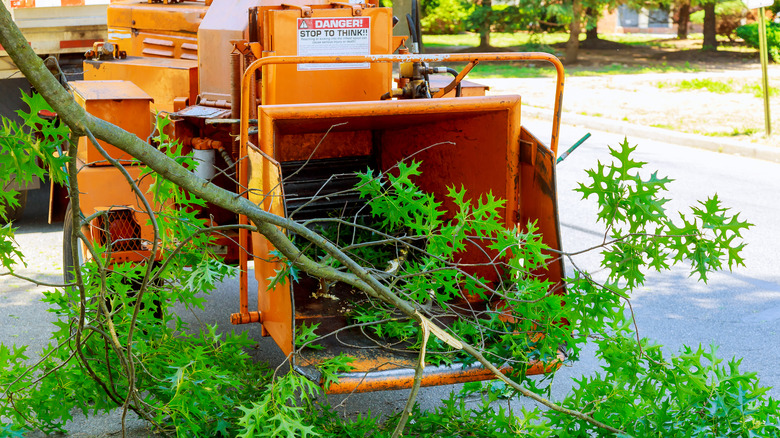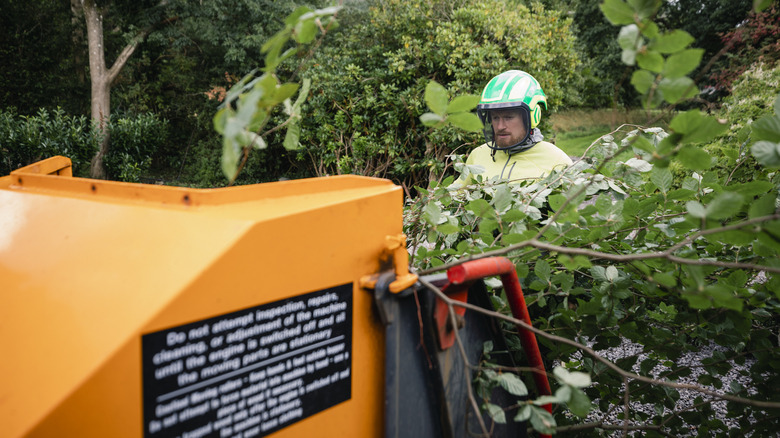Is It Better To Rent Or Buy A Wood Chipper For Yard Projects? It Depends
Wood chippers can be incredibly useful when tackling outdoor projects, and better yet, you don't need to be a professional landscaper to get one. There are many reasons you'd want to use a wood chipper around your yard, whether it's to make your own mulch from previously pruned tree limbs or simply make the branches easier to transport to your local landfill or nursery after a long day of landscaping. Suppose you're planning to knock out several landscaping projects over the course of a season or a major outdoor project that may take weeks or months to complete. In that case, you might think that purchasing your own chipper will be cheaper and more convenient than renting everything long-term. As it turns out, whether it's best for you to rent or buy a wood chipper depends on many factors, including the frequency with which you'd use it.
All wood chippers are extremely powerful instruments, but they certainly aren't all built the same. The size and strength of the machine determine the types of projects it can handle. For example, larger, gas-powered wood chippers are better suited for bigger jobs than smaller, electric ones. Costs to rent and buy wood chippers will vary depending on size and horsepower, so weigh your options based on your wood-chipping needs and consider consulting a specialist before making a final decision. Here's a breakdown of the pros and cons of each choice to help you decide which course of action is best for you.
Pros and cons of renting
Renting is ideal if you only need to use a wood chipper for a limited time. This arrangement offers more flexibility, allowing you to borrow the machine without worrying about permanently housing or servicing it if it breaks down. You can easily rent a wood chipper in your area from big-box stores like Lowe's or a locally-owned power equipment rental agency by visiting the supplier's website or calling them on the phone. While each rental company's rate structure is different, renting the average wood chipper can cost hundreds of dollars per day and even more when renting over the course of a weekend.
A downside to renting is that wood chippers won't always be available when you need them. Rental companies will sometimes run out of equipment during a popular season for pruning and cutting down trees, so you might have to adjust your work schedule to the earliest time that a company has a machine on hand for you to use. And because rental wood chippers are used so frequently, there's a chance that the machine you wind up with won't be as strong or efficient as a new chipper purchased from a retailer. This means it may take the wood chipper more time overall to get the job done.
Pros and cons of buying
Perhaps the greatest advantage of buying a wood chipper is the freedom to use it whenever you want. No matter how many projects you take on, having your own chipper allows you to easily fit yard work into your weekly schedule. When you buy a wood chipper, you also have peace of mind knowing you're operating a brand new machine and are one of–if not the first person–to use it. Wood chippers are sold at locally-owned power equipment retailers and stores like Lowe's, Home Depot, and Tractor Supply Company. You can find some smaller models for less than $1,000, but larger, more powerful varieties can cost over $3,000.
However, the operation costs extend beyond the initial purchase of the machine. Owning a wood chipper means you'd also be responsible for keeping it maintained. While the machines shouldn't break down often, dedicating time to performing regular maintenance, like sharpening the blades and checking the air filter for dirt blockage, is crucial to keep wood chippers operating at peak efficiency. Still, when the machine eventually succumbs to a mechanical issue, the costs of sourcing parts and paying for labor, if you're unable to repair the chipper yourself, can add up and put you in a rough spot financially. Investing in a higher-quality machine from the start can prevent you from making multiple trips to the repair shop in the future.


